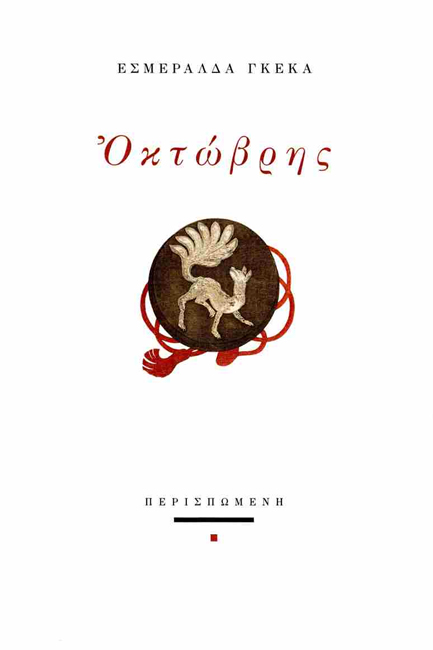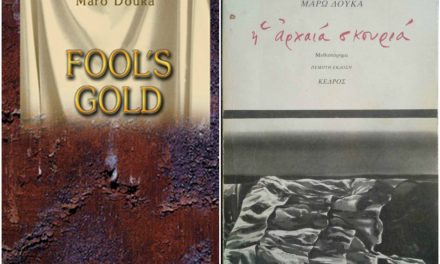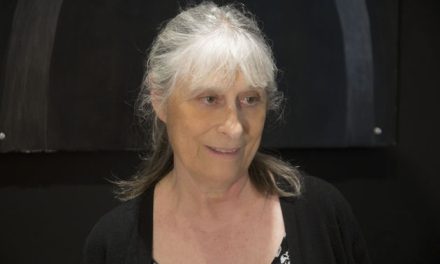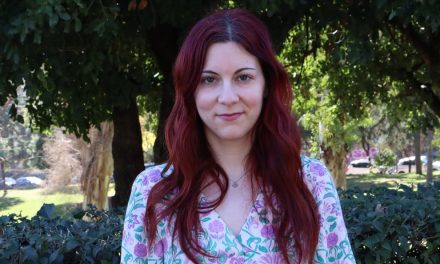Esmeralda Geka was born in Athens. She studied Law at the Law School of Athens and holds a postgraduate degree in Civil Law (University of Athens). She works as a lawyer. She has published four poetry collections so far: Pulchritudo Bestiae (Gavriilides, 2012), Ουρανόδεικτος [Sky-struck](Gavriilides, 2014), Παράδοξος Ύπνος [Strange Sleep] (Gavriilides, 2019), Οκτώβρης [October] (Perispomeni, 2024). The first three, being out of print, will soon be republished by Perismopeni.

Your latest writing venture Οκτώβρης [October] was recently published by Perispomeni. Tell us a few things about the book.
My October is a child of irony, magic and humor. Funny because I never thought I would write a love poetry collection, since in my universe poetry and love are two Titans who live together in different places and don’t get together much. Nevertheless, in a period of poetic apnea, when I was beginning to panic, I wished with all my might that something would happen so that I could write again. And like any wish, this one was granted, but its realization came in two ways. A deep wound in exchange for a few verses.
Αs you realize, poetry in October is entirely experiential; it inadvertently embraces pretty much the whole spectrum of Eros (seen from a feminine perspective, but hopefully not exclusively female) and this may be of some interest. I’m not sure if I can even speak with equanimity about this book yet. But I can say a few words about its title. October is my ultimate fictional male figure, oddly enough since forever, with those brooding eyes and his thick brown beard. October weighs all opposites, he comes from the sun but gestates winter, the leaves within him color and dance falling, he bears the new fruit, the invisible. Its sweat smells of soil and promise. And thus the verses in this book exude an autumnal dampness… I think.
Finally, I would like to mention how proud I feel that Perispomeni embraced this work and dressed it with this exceptional aesthetics.
Love is the central theme of the book. How does it relate to doubt, absence or even death in your poems?
There are three milestones of life (birth, death, love), two of which we do not perceive as such (life, death), and a third (love), which binds us to the essence of the other two. And this view of death and life being two sides of the same coin is first perceived in the cells as soon as one experiences a particular form of love, that is eros. The absence of the other is violently perceived as the loss of life, doubt a bittersweet poison that to a certain extent inflates the gene of love, while at the same time smoulderingly destroys components of individuality itself. Until the self of the lover – as he/she knew it – ceases to exist, dies. I have a verse in October that sums up what I describe “It wasn’t you. It was what you did to me. That made me no longer be me.”
Of course, because there is a cyclicality to the universe, all of these can then become a rich fertilizer for the rebuilding of a stronger personality, but the individual is never the same again and the memory of the first self, the innocent, will always be present as a sting.
You have published four poetry collections so far? Which are the main themes your poetry touches upon? Are there recurrent points of reference in your writings?
Indeed, four poetry collections have been published so far. The first three were originally published by Gavriilides (Pulchritudo Bestiae, Sky-struck, Strange Sleep), αnd will soon be re-published by Perispomeni while the fourth, October, is also published by Perispomeni.
The first two, written at a very young age, have a more exploratory and philosophical disposition towards human life. With a particular emphasis on form (compositional, theatrical poetry), they are both a discussion of a dual dimension I carry within me, instinctively searching for the things of the world and of life. In the third and fourth books things change. Experience has replaced instinct. So, Strange Sleep contains poems I wrote during a period of insomnia I experienced and they touch on that part a lot, while October is of course about love.
I do, however, have three major obsessions, which are recurrent: the question of believing in something, the moon and myths. All, in a way, now that I think about it, touch on the inner emotional human world, which is the only one that concerns me, as a person and a writer. I am very moved by the question of faith, and I don’t necessarily mean religious faith or faith in something higher. It’s just that thread that makes you more open to the invisible, and it feels like something so sensitive, instinctual and sacred that it shouldn’t be treated with nothing but love and caresses. I don’t have much to say about the moon…my cat’s name is Selene. Otherwise, if you open to a random page of any of my books, you will probably stumble upon something lunar. Finally, the common thread in all my books, and a point I’ll probably never get over because it has shaped me, is a reference to myths (primarily ancient Greek). Myths I will never be able to disentangle from my thoughts and verses. You will see mythological figures, especially female ones, reappear in my books (Persephone, Hecate, Galatea). I feel that myths do what poetry does: they summarize and elevate depth.

What about language? What role does language play in your writings?
To begin with, there is no poetry without language; it’s technically impossible. Maybe poetics, but not poetry.
As for Greek language in particular, I am personally driven by a religious type of obsession. I could not write in any language other than Greek. Greek, in its complexity and timelessness, is a playful language par excellence, and poetry is very much about play after all. It’s while playing that our clays soften and mould better and penetrate each other. That’s why I love playing with rhythms and rhymes, moulding words, sometimes even changing the spelling of words (for example, I want the word “pegasus” in my poems to be spelled with a double ‘s’). Despite its many corrosions, the Greek language still carries a ritualistic pulse. I feel it running through my veins, as if it could penetrate my innermost caves carrying all the memory and experience of this land and the ether. And so I feel closer to whatever – unholy and animalistic – material I carry within me, and it’s only in this way that I can draw it out and put in on paper.
How does poetry converse with the world it inhabits? Could poetry be used to imagine what could be radically different realities?
A person I trust has expressed the opinion that poetry is a completely anachronistic way of writing, having no place in the modern world. For me – both as a reader and as a writer – poetry is my means of escaping the world by penetrating more deeply into the human being. However, poetry certainly draws material from the world, at least through language. From there onwards, everyone handles their way of writing differently. Personally, poetry that depicts contemporary reality is of little concern to me. I want poetry to enchant the world it inhabits and to be enchanted by it.
As for the the second part of the question, I’m not sure. Poetry can certainly reconstruct the present with its feet in the past and its hair in the future; yet, it has a timeless wisdom that allows it to suspect that the world cannot fundamentally change. Radically, however, it has the right – and the duty – to dream.
How do contemporary poets converse with global literary trends? Where does the local meet the national and the universal?
It has often been argued that in order to be considered contemporary and up-to-date, a writer should follow and comply with current international trends. This has to do with how you view poetry. I don’t really agree. Personally, I could only have joined the surrealism movement, yet I am not inspired by any contemporary one. My point is that a constant over-effort to appear contemporary or international may prove detrimental to speech authenticity.
In addition, we may be leaning towards globalization, but not all communities behave the same no matter how much they wish to. There still exist those local singularities and specificities that may not be fully understood internationally. It’s that language material that melts under another sun, scatters under another wind, in its dream at least. This does not mean, of course, that peoples do not meet in literature. It is just that this does not happen when we fully comply with uniform trends internationally. Instead, it happens magically when literature sheds its skin letting light flow to the bone, the essence of humans, which is ultimately single. It’s there that the local meets the borderless and the contemporary meets the timeless.
*Interview by Athina Rossoglou
TAGS: LITERATURE & BOOKS | READING GREECE














